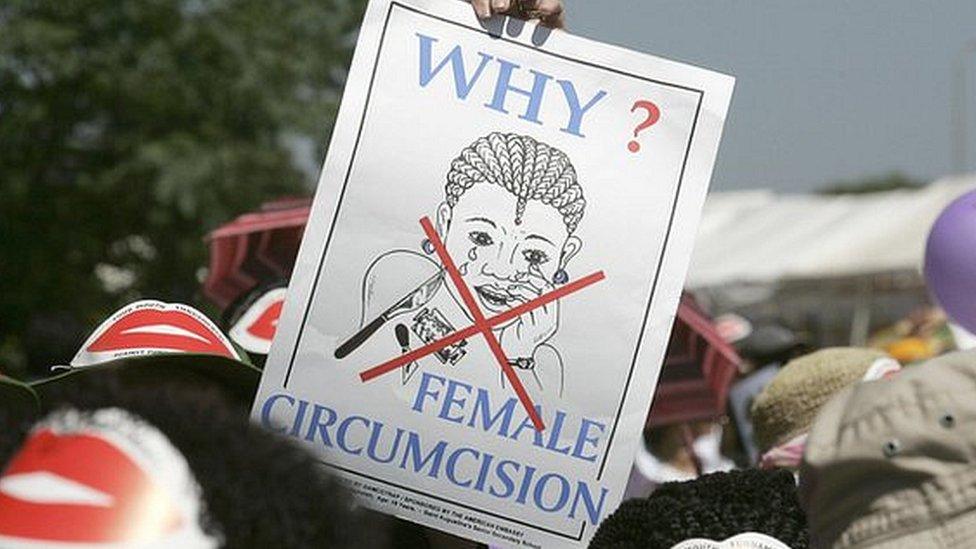NHS uncovers 1,000 FGM cases in England
- Published

There were more than 1,000 newly recorded cases of female genital mutilation (FGM) in England between April and June, NHS data reveals.
For the first time the official figures were expanded to include information from general practices and mental health trusts.
They show nine cases where girls were under 18 when first seen.
FGM is illegal across the UK and it is illegal to take someone abroad for this purpose.
Not all cases would have taken place in the past three months - some may have been picked up at routine appointments for other health issues many years after the incidents occurred.
And the report did not look at whether the cases took place in the UK or abroad.
Sometimes called female circumcision, FGM refers to procedures including the partial or total removal of external female genital organs for non-medical reasons.
It can cause issues including severe pain, infections, pregnancy complications and even death.
The Health and Social Care Information Centre figures, external covered cases of FGM reported by the women and girls themselves and others recorded by clinicians during appointments.
'Global dimension'
Experts say figures on the practice have been patchy and it is difficult to know exactly how many women have been affected by FGM.
But the government has plans to make data collection mandatory across many areas of the NHS.
Tanya Barron of the charity Plan UK said global action was needed to tackle this problem.
She added: "It's shocking to see the extent of FGM here in the UK.
"We've seen hugely increased attention on this problem in the past few years and we are now waking up to the scale of this terrible practice.
"What we must always keep in mind though is that this is not specifically a British problem.
"FGM is a practice with an inherently global dimension.
"And while it's vital that we do everything we can to stop FGM here in the UK, as well as to support the girls and women affected by it, the reality is that this practice won't end in the UK until it is ended worldwide."

Analysis: What do the numbers show?
Smitha Mundasad, health reporter
Charities say it is very difficult to know exactly how many women have been affected by FGM in the UK.
And many of the cases recorded by the NHS in the last three months will have not have taken place recently.
There are a number of reasons women or girls do not talk openly about FGM soon after it happens - including the fear of stigma or getting people into trouble.
Some incidents may come to light years later - for example at a hospital appointment for an unrelated issue or during an antenatal visit.
What is new is a concerted push to collect more data on FGM.
In the last few months clinicians in acute hospitals in England have been told it is mandatory to record any cases they see - whether they were previously recorded by NHS systems or not.
And in October this reporting will be mandatory for GP practices and mental health specialists as well.
Many practices have already started collating these figures and some have been used in this latest report.
For these reasons we can't compare any previous figures and so experts don't yet have a sense of what the trend is.
But there are many experts who hope that more data will help them better understand the scale of the problem.

- Published21 July 2015

- Published17 July 2015

- Published12 February 2015
